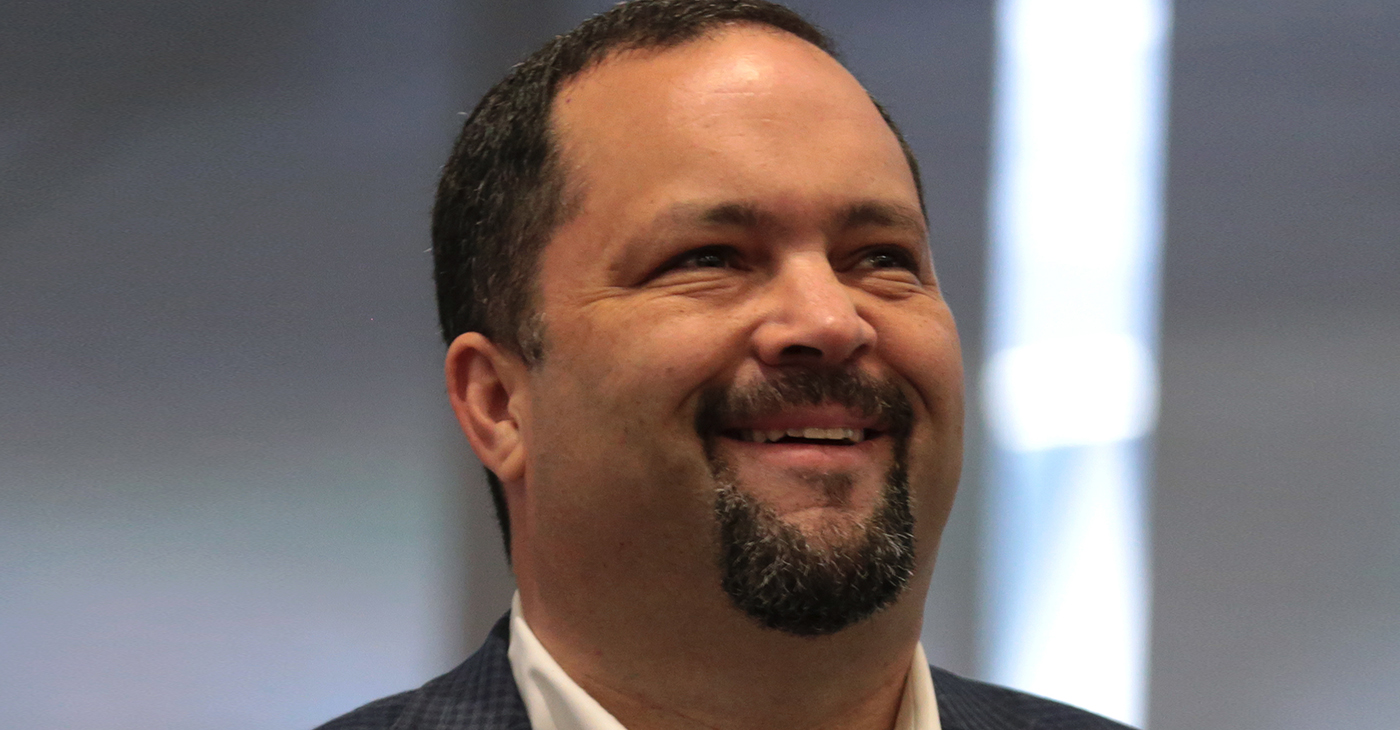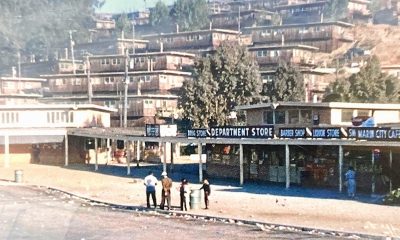Activism
COMMENTARY: From Selma to the Supreme Court, We Are Still Making History
A coalition of local and national civil rights groups used this year’s Bloody Sunday commemorations as a time to look forward as well as back. They organized a march and a series of voting rights events along the route of the original Selma to Montgomery march. They are lifting up younger generations of leaders and mobilizing activists around the nation, between voting rights and the broader movement to advance opportunity and economic justice.

By Ben Jealous
History was made in Selma, Alabama, on March 7, 1965. Alabama state troopers viciously attacked peaceful voting rights marchers at the Edmund Pettus Bridge. The troopers were hoping to stop the voting rights movement in its tracks.
But their violence did the opposite. Televised images of “Bloody Sunday” offended the conscience of people of good faith around the country. The movement was energized. And soon, the federal Voting Rights Act became law.
Voting rights activists were back in Selma this month to commemorate history — and to make it.
Vice President Kamala Harris spoke at the Edmund Pettus bridge. As the first Black woman to hold that high office, she embodies many of the victories of the civil rights movement. From that “hallowed ground,” she spoke truth about the “un-American” laws that have passed in many states to make it harder for Black people and others to vote.
Harris recognized that 2022 is not 1965, as her presence made clear. “We again, however, find ourselves caught in between,” she said.
“Between injustice and justice. Between disappointment and determination. Still in a fight to form a more perfect union. And nowhere is that clearer than when it comes to the ongoing fight to secure the freedom to vote.”
The threat to voting rights today comes most directly from state legislators and governors putting laws in place that make it harder for Black people and others to vote. The threat also comes from a far-right-dominated Supreme Court that has mostly abandoned voting rights in favor of “states’ rights.”
In a 2013 decision in a case that began in Shelby County, Alabama, the court’s majority gutted a section of the Voting Rights Act that prevented states from imposing racially discriminatory changes in voting laws and regulations.
Since then — and especially since historic turnout by Black voters helped defeat Donald Trump’s reelection bid—legislators in state after state have passed new barriers to voting. The Supreme Court is letting them get away with it.
And just recently the Supreme Court’s far-right justices allowed Alabama to hold elections this year using racially gerrymandered congressional maps created by the state Legislature. That was another signal to Black voters and voting rights supporters that the current court majority cannot be counted on to protect our rights.
We must organize. We must elect pro-voting-rights majorities in Congress and state legislatures wherever we can. And we must demand that they take action to protect our democracy.
That brings us back to Selma. As a young man, the late Rep. John Lewis nearly gave his life on the Edmund Pettus bridge to secure voting rights. Activist leaders of this generation are now building on that history and making their own.
A coalition of local and national civil rights groups used this year’s Bloody Sunday commemorations as a time to look forward as well as back. They organized a march and a series of voting rights events along the route of the original Selma to Montgomery march. They are lifting up younger generations of leaders and mobilizing activists around the nation, between voting rights and the broader movement to advance opportunity and economic justice.
At the same time, civil rights activists around the country are organizing to achieve another historical milestone: the confirmation of Judge Ketanji Brown Jackson as the first Black woman to serve as a U.S. Supreme Court justice. As expected, Judge Jackson’s nomination has been met with some resistance and racist commentary. But it is generating even more excitement and enthusiasm.
Our country’s history is in part a history of struggle to achieve hard-won progress toward more universal access to rights and opportunities. That is still our struggle today. Like the work of the activist leaders who are building a movement to protect voting rights and expand access to opportunity, the confirmation of Judge Jackson will move the nation forward toward the ideal of equal justice. It’s our turn to keep our feet on the ground, our shoulders to the wheel, and our eyes on the prize.
Ben Jealous serves as president of People For the American Way and Professor of the Practice in the Africana Studies Department at the University of Pennsylvania where he teaches leadership. Jealous has decades of experience as a leader, coalition builder, campaigner for social justice and seasoned nonprofit executive.
Activism
Oakland Post: Week of April 17 – 23, 2024
The printed Weekly Edition of the Oakland Post: Week of April 17 – 23, 2024

To enlarge your view of this issue, use the slider, magnifying glass icon or full page icon in the lower right corner of the browser window. ![]()
Activism
Oakland Schools Honor Fred Korematsu Day of Civil Liberties
Every Jan. 30, OUSD commemorates the legacy of Fred Korematsu, an Oakland native, a Castlemont High School graduate, and a national symbol of resistance, resilience, and justice. His defiant stand against racial injustice and his unwavering commitment to civil rights continue to inspire the local community and the nation. Tuesday was “Fred Korematsu Day of Civil Liberties and the Constitution” in the state of California and a growing number of states across the country.

By Post Staff
Every Jan. 30, OUSD commemorates the legacy of Fred Korematsu, an Oakland native, a Castlemont High School graduate, and a national symbol of resistance, resilience, and justice.
His defiant stand against racial injustice and his unwavering commitment to civil rights continue to inspire the local community and the nation. Tuesday was “Fred Korematsu Day of Civil Liberties and the Constitution” in the state of California and a growing number of states across the country.
One OUSD school is named in his honor: Fred T. Korematsu Discovery Academy (KDA) elementary in East Oakland.
Several years ago, founding KDA Principal Charles Wilson, in a video interview with anti-hate organization “Not In Our Town,” said, “We chose the name Fred Korematsu because we really felt like the attributes that he showed in his work are things that the children need to learn … that common people can stand up and make differences in a large number of people’s lives.”
Fred Korematsu was born in Oakland on Jan. 30, 1919. His parents ran a floral nursery business, and his upbringing in Oakland shaped his worldview. His belief in the importance of standing up for your rights and the rights of others, regardless of race or background, was the foundation for his activism against racial prejudice and for the rights of Japanese Americans during World War II.
At the start of the war, Korematsu was turned away from enlisting in the National Guard and the Coast Guard because of his race. He trained as a welder, working at the docks in Oakland, but was fired after the bombing of Pearl Harbor in 1941. Fear and prejudice led to federal Executive Order 9066, which forced more than 120,000 Japanese Americans out of their homes and neighborhoods and into remote internment camps.
The 23-year-old Korematsu resisted the order. He underwent cosmetic surgery and assumed a false identity, choosing freedom over unjust imprisonment. His later arrest and conviction sparked a legal battle that would challenge the foundation of civil liberties in America.
Korematsu’s fight culminated in the Supreme Court’s initial ruling against him in 1944. He spent years in a Utah internment camp with his family, followed by time living in Salt Lake City where he was dogged by racism.
In 1976, President Gerald Ford overturned Executive Order 9066. Seven years later, the 9th Circuit Court of Appeals in San Francisco vacated Korematsu’s conviction. He said in court, “I would like to see the government admit that they were wrong and do something about it so this will never happen again to any American citizen of any race, creed, or color.”
Korematsu’s dedication and determination established him as a national icon of civil rights and social justice. He advocated for justice with Rosa Parks. In 1998, President Bill Clinton gave him the Presidential Medal of Freedom saying, “In the long history of our country’s constant search for justice, some names of ordinary citizens stand for millions of souls … To that distinguished list, today we add the name of Fred Korematsu.”
After Sept. 11, 2001, Korematsu spoke out against hatred and discrimination, saying what happened to Japanese Americans should not happen to people of Middle Eastern descent.
Korematsu’s roots in Oakland and his education in OUSD are a source of great pride for the city, according to the school district. His most famous quote, which is on the Korematsu elementary school mural, is as relevant now as ever, “If you have the feeling that something is wrong, don’t be afraid to speak up.”
Activism
WOMEN IMPACTING THE CHURCH AND COMMUNITY
Juanita Matthews, better known as “Sister Teacher,” is a walking Bible scholar. She moved to California from the great state of Arkansas in 1971. Sister Teacher has a passion for teaching. She has been a member of Bible Fellowship Missionary Baptist Church since 1971.

Sister Juanita Matthews
55 Years with Oakland Public School District
The Teacher, Mother, Community Outreach Champion, And Child of God
Juanita Matthews, better known as “Sister Teacher,” is a walking Bible scholar. She moved to California from the great state of Arkansas in 1971. Sister Teacher has a passion for teaching. She has been a member of Bible Fellowship Missionary Baptist Church since 1971. She followed her passion for teaching, and in 1977 became the lead teacher for Adult Class #6. Her motto still today is “Once My Student, Always My Student”.
Beyond her remarkable love for the Lord, Sister Teacher has showcased her love for teaching by working for the Oakland Unified School District for 55 years, all but four of those years spent at Emerson Elementary and Child Development School. She truly cares about her students, making sure they have the tools/supplies needed to learn either at OUSD or Bible Fellowship Missionary Baptist Church.
She’s also had a “Clothes Closet Ministry” for 51 years, making sure her students have sufficient clothing for school. The Clothes Closet Ministry extends past her students, she has been clothing the community for over 50 years as well. She loves the Lord and is a servant on a mission. She is a loving mother to two beautiful children, Sandra and Andre. This is the impact this woman of God has on her church and the community.
-

 Activism3 weeks ago
Activism3 weeks agoOakland Post: Week of March 27 – April 2, 2024
-

 #NNPA BlackPress4 weeks ago
#NNPA BlackPress4 weeks agoCOMMENTARY: D.C. Crime Bill Fails to Address Root Causes of Violence and Incarceration
-

 #NNPA BlackPress4 weeks ago
#NNPA BlackPress4 weeks agoFrom Raids to Revelations: The Dark Turn in Sean ‘Diddy’ Combs’ Saga
-

 #NNPA BlackPress4 weeks ago
#NNPA BlackPress4 weeks agoCOMMENTARY: Lady Day and The Lights!
-

 #NNPA BlackPress4 weeks ago
#NNPA BlackPress4 weeks agoMayor, City Council President React to May 31 Closing of Birmingham-Southern College
-

 #NNPA BlackPress4 weeks ago
#NNPA BlackPress4 weeks agoBaltimore Key Bridge Catastrophe: A City’s Heartbreak and a Nation’s Alarm
-

 #NNPA BlackPress4 weeks ago
#NNPA BlackPress4 weeks agoBaltimore’s Key Bridge Struck by Ship, Collapses into Water
-

 #NNPA BlackPress3 weeks ago
#NNPA BlackPress3 weeks agoBeloved Actor and Activist Louis Cameron Gossett Jr. Dies at 87





















































